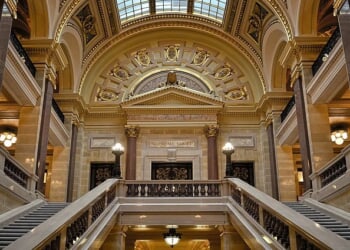Claire Coutinho is the MP for East Surrey and Shadow Secretary of State for Energy Security and Net Zero.
Every single operational nuclear power plant in Britain today was started under a Conservative Government.
There is a long history of the left opposing nuclear power. In 1997, Tony Blair decreed there was “no economic case for the building of any new nuclear power stations,” and indeed none were started in the 13 years of Labour rule. In 2010, the Liberal Democrats gained the energy brief under the Coalition, where Nick Clegg promptly decided that nuclear “isn’t even an answer” because it wouldn’t have come online until 2021 or 2022. Even now, with energy security at the top of the agenda, the current Green Party position is to phase out nuclear altogether.
The decades-long moratorium on new nuclear was ended in 2015, when we Conservatives gained the energy brief. In Government we started two new plants in Somerset and Suffolk, with a third agreed in Wales – and a fleet of next generation smaller reactors also on the way.
Whilst Labour are paying lip-service to continuing that work, they have in fact scrapped our target for nuclear to provide a quarter of our electricity supply in 2050, axed the third nuclear plant I had agreed at Wylfa, and downgraded our ambitions for our small modular reactor programme. This is an anti-growth mindset. Nuclear power gives us reliable, 24/7 power that will provide abundant, secure energy that can cut costs and reduce people’s bills.
Labour are going slow on nuclear because Ed Miliband’s obsession with wind and solar farms has made him blind to their soaring costs and the challenges they pose for our beautiful but small islands.
However, there is a cost challenge. Hinkley Point C will be the most expensive nuclear power station in history. This is, in part, because of our own bureaucracy and rampant lawfare.
Nuclear developments are subject to endless environmental paperwork – much of it derived from legacy EU law – which is then challenged in the courts by eco-activists. This does very little to protect nature but creates plenty of expensive work for planning consultants and pencil-pushing bureaucrats. Every single delay and absurd mitigation measure adds more cost.
At Hinkley Point C, for example, EDF have spent eight years negotiating the installation of a ‘fish disco’ of 288 underwater loudspeakers, at the cost of millions of pounds, to deter a small amount of fish from swimming into their pipes. Ironically, the self-proclaimed eco-activists pushing this through the courts end up causing more harm to nature overall, since increasing the cost and time it takes to build nuclear means we end up building thousands upon thousands of wind turbines and solar farms in every corner of the country. This is insane.
But we have a plan to stop it. The Conservatives have tabled radical amendments to the Planning and Infrastructure Bill to end a system where paperwork is put above the national interest and our need for cheap, reliable energy. No more environmental impact assessments thirty times longer than the complete works of Shakespeare. No more pointless, gold-plated fish discos. No more bogus judicial reviews from anti-growth activist groups who just want to kill off the infrastructure that is critical to our national and energy security.
Britain built the world’s first commercial civil nuclear power plant. We used to have more nuclear power than anywhere in the world. None of these absurd environmental rules even existed when we were building dozens of safe, zero-emission nuclear plants that powered homes and industry reliably – and at low cost – for decades.
Nuclear is already the most pro-nature source of energy in existence. It is so dense that you would need 3,000 times more land to produce the same amount of energy from a wind farm.
It is also an economic imperative that we get on with nuclear because, despite what the green lobby tells us, wind and solar are not cheap.
Last year, Ed signed us up the highest wind prices in a decade – 15 per cent higher than the average cost of electricity. That is before you add in the costs of grid, storage, and wasted wind which are soaring thanks to his botched plans. The auction he is about to launch during summer recess, away from parliamentary scrutiny, will see him do the same again.
And where is he buying all this kit from? Whether its solar panels, batteries or critical minerals, the beneficiary of these billpayer subsidies is too often Chinese factories powered by coal and slave labour.
For too long Westminster has been obsessed with driving every last gram of carbon out of our atmosphere, and driving the cost of energy up in the process – instead offshoring our businesses to more polluting countries like China. A desire to meet climate targets has been prioritised over our need for a growing economy, a strong industrial base, or skilled, well-paid jobs.
We cannot pursue Net Zero targets at the expense of our energy prices and the strength of our economy. Cheap, secure energy has to come first. That is why Kemi Badenoch and I have been clear that Net Zero by 2050 is impossible without bankrupting the country.
Nuclear power can provide the secure, reliable, cheap energy that we need. We just need politicians brave enough to change the law to allow us to carry it through.
If Labour were serious about growth, they’d back our amendments to lift the barriers standing in the way of a true golden age of nuclear.


![Former Bravo Star Charged After Violent Assault Using a Rock-Filled Sock in Tennessee Walmart [WATCH]](https://www.right2024.com/wp-content/uploads/2025/07/Former-Bravo-Star-Charged-After-Violent-Assault-Using-a-Rock-Filled-350x250.jpg)




![Karoline Leavitt Levels CNN's Kaitlan Collins and Other Legacy Media Reporters [WATCH]](https://www.right2024.com/wp-content/uploads/2025/07/Karoline-Leavitt-Levels-CNNs-Kaitlan-Collins-and-Other-Legacy-Media-350x250.jpg)
![Man Arrested After Screaming at Senators During Big Beautiful Bill Debate [WATCH]](https://www.right2024.com/wp-content/uploads/2025/06/Man-Arrested-After-Screaming-at-Senators-During-Big-Beautiful-Bill-350x250.jpg)
![Illegal Alien Walked Free After Decapitating Woman, Abusing Corpse for Weeks [WATCH]](https://www.right2024.com/wp-content/uploads/2025/07/1753013138_Illegal-Alien-Walked-Free-After-Decapitating-Woman-Abusing-Corpse-for-350x250.jpg)







